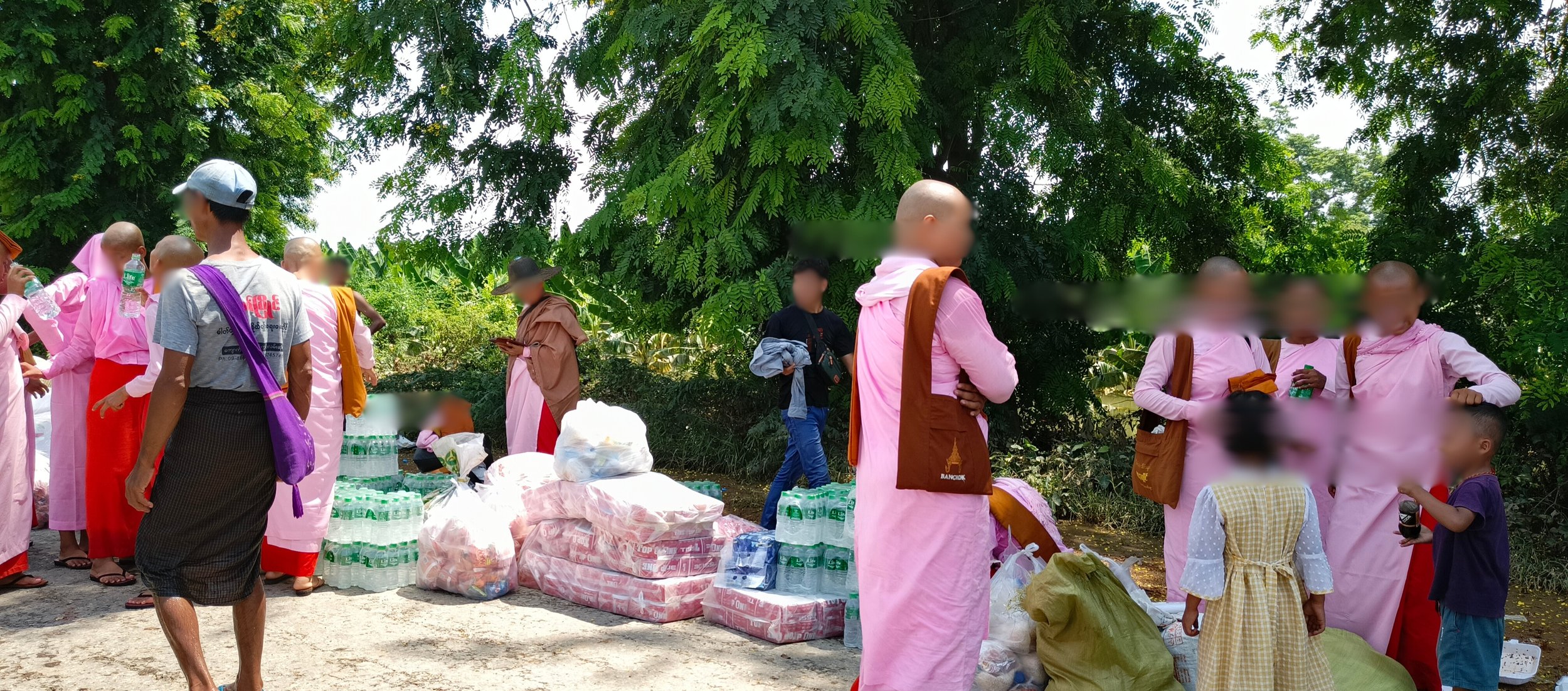Humanitarian Supplies reach Kyaukse
As we have recently shared, heavy floods have devastated Kyaukse, a town sacred to Webu Sayadaw, severely affecting monastic and lay communities. Thousands have been displaced. The flooding, caused by the release of water from nearby dams, has left many areas submerged, including monasteries and hospitals. Aid is scarce, with children and elderly at risk of hunger and illness. Despite the dire situation, the military has exacerbated the crisis through violence. We put out a call to international meditators asking for help towards the affected communities, and they responded! Here is the update regarding the relief mission, written by our team leader
Today, we joined a flood relief campaign and went to Kyaukse to help the flood victims in a village called Kon Gyi, west of Kyaukse. We contributed 5 sacks of rice (120 Pyi = 240 kilos) and 600 eggs for 120 families in the village. We delivered 1 sack of rice and 5 eggs for each family in the village.
I would like to retell you all what I saw and heard, and what I experienced on the trip today.
We went there in 7 vehicles: 5 trucks from the nunneries and 2 vans including our car, in a line. We were informed by the local volunteers that we could not travel in a compact car as the roads were too rough. This is why, the leading nuns and we planned to travel in two SUV cars. We went to Kyaukse via the Mandalay - Yangon Highway (old). The local volunteers from the villages came to downtown Kyaukse and took us to the destination village. They said that we could not travel the straight way as they commonly went to their villages because it is a dirt road and washed away by the flooding of the Zawgyi River in the town. We went a longer curving way to the village.
The village is quite far from Kyaukse and is located to the southwest. When we reached Kyaukse, we saw the high water level of the Zawgyi River when we crossed the bridge, which the locals call as 'Kyaukse View Point'. After crossing, we turned aside from the highway and went down the country road. After we crossed a ford on the way by car, we had to stop all the cars and trucks in front of a factory which was flooded and completely closed. We then had to cross a stream and transport all the goods by boat there where the water level is as high as an adult man's neck. At another stream, the local volunteers informed us of the fast water flow and we saw ropes fixed at the sides of the road. They gave us their hand to help us walk across the stream. The water flow was too fast to walk!
One villager said that the streams we crossed were not there and they were also not fords there before. In fact, the flooded water washed away the road and its embankment and base layers. We could feel as we stepped across this one particular deep place where it was quite dangerous! After we crossed another place where the water was speedily flowing, the villagers came to transport the goods by the so-called Chinese-manufactured Troller-G trucks and ox-carts.
At that time, we were already 2.30 pm and we realized that it was just half the way only. The villagers told us that we had to travel about two more hours and then cross two notorious rivers called the 'Samone River' and 'Panlaung River'. When I checked on Google Maps, it was true, and we even had to pass some more villages called Magyi Taw (on the bank of the Panlaung River), Samar (on the bank of Samar Village), and Kyaukmasit where the aged and children got unconscious as they suffered from hunger for a few days. Oh what terrible things are happening in our country now!
Anyway, I noticed their calls for rescues and help last week because of the far distance from the town from where they live. A local volunteer who came with us told me that about 100 folks from his village ran onto a bridge and stayed there for two full nights. Pointing to two children playing around us, he said that their parents are his relatives and requested him to take them to the town when his family went up to the town and stayed at a monastery in an urban area. That man was in his 60s and he was exhausted from carrying things from the boat and then felt dizzy, hence he lay down on the ground near us. We gave him some soft drinks and he felt better, I hope.
This was the start of our aid trip, and I will continue to tell the rest of the story in an upcoming essay when I again get time to share those details with our international supporters. I tell you all again, thank you for not forgetting us in our hour of need.










